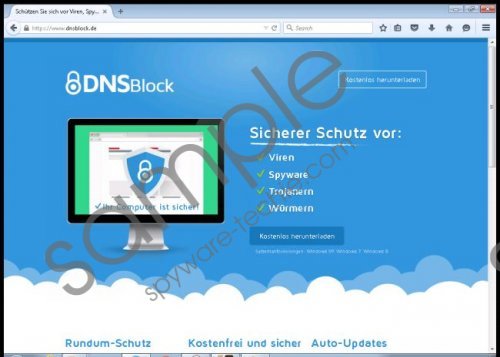Do you know what DnsBlock is?
DnsBlock is a potentially unwanted program that mainly targets German-speaking computer users. This application is not a malicious computer infection, but it may enter your system uninvited when you install freeware and other suspicious software. Do yourself a favor and remove DnsBlock right now, because there is no need to keep a program if you had no intention of installing it. What’s more, you should run a full system scan with a licensed antispyware tool to get an idea of your current safety status. Do not just sit and wait until something ugly comes crashing your way.
If we were to take a closer look at dnsblock.de, which is the official homepage for DnsBlock, we would see that the application is promoted as a “reliable protection against viruses, spyware, Trojans, worms.” It is supposed to protect your DNS from malicious exploitation, but it is highly doubtful whether the program can really perform all the functions it boasts of. Naturally, if you downloaded the application willingly, then you probably know what to expect of it, but, if it came bundled with other software, you should not even wait to see what DnsBlock does. Any unwanted application should be removed from your PC at once! DnsBlock screenshot
DnsBlock screenshot
Scroll down for full removal instructions
You must be wondering how DnsBlock managed to enter your system if you have never visited dnsblock.de. Our research shows that this program is distributed in software packages. In fact, it is far more likely that third-party distribution is the more prevalent. For example, whenever you access a file-sharing website, there is a good chance that you will download the likes of DnsBlock along with the program you have been looking for. How do you avoid that? Go through the installation process carefully. Read all the steps and always choose the custom installation option. Users often can avoid installing unwanted applications, but they simply breeze through the installation without giving it a second thought.
It would be quite nice if DnsBlock could really protect your DNS from viruses and other malicious infections, but these days nothing comes for free. You have to keep in mind that the application needs to support itself somehow and cover its production costs. How does it do that? Our bet is on the third-party advertising. DnsBlock definitely has an ability to display commercial pop-ups and other types of advertisements when you browse the web. The program does not add any extensions to your browser, but it has two running processes called DnsBlockTray and DnsBlockUpdateSvc. With these two services, the program can connect to the Internet and upload the information it has collected on your browsing history.
To be honest, this kind of activity is rather common among potentially unwanted programs, adware, and even popular websites, but when such behavior is exhibited by an application you did not want to have, it should be rather alarming. Thus, you should delete DnsBlock from your computer as soon as possible because you have to avoid all the potential security threats. Uninstalling the program via Control Panel should be enough to remove all its files, but, just to be on the safe side, run a full system scan with the SpyHunter free scanner once you are done with the manual removal.
How to Remove DnsBlock
Windows 8 & Windows 8.1
- Move the mouse cursor to the lower right corner of your screen.
- When the Charm bar appears, click Settings and go to Control Panel.
- Open Uninstall a program and remove DnsBlock.
Windows Vista & Windows 7
- Open the Start menu and click Control Panel.
- Go to Uninstall a program and remove DnsBlock.
Windows XP
- Click the Start button and navigate to Control Panel.
- Select Add or remove programs and uninstall DnsBlock.
In non-techie terms:
DnsBlock is a freeware application that is supposed to protect your DNS from malicious exploitation. Unfortunately, this program may also come bundled with freeware. If you think that DnsBlock entered your PC uninvited, you should remove this application at once. For full computer protection, do not hesitate to invest in a legitimate computer security tool of your choice. Also, should you have any further questions on how to deal with unwanted software, please feel free to leave us a comment below.
